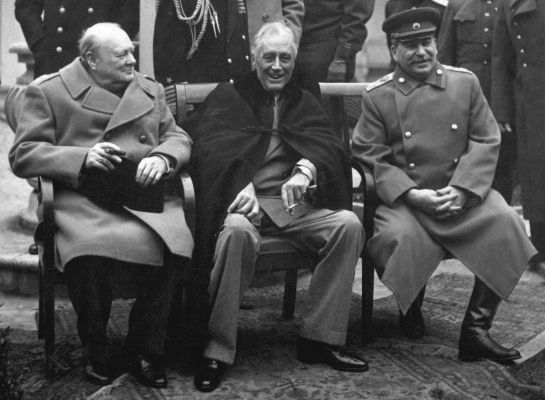Introduction
World War II, spanning from 1939 to 1945, remains one of the most significant events in world history. The global conflict involved the vast majority of the world’s nations, including all of the great powers, eventually forming two opposing military alliances: the Allies and the Axis. The scale of the war highlighted the critical role of leadership in both the military and political spheres. Leaders from various nations wielded their power in ways that directly influenced the strategies and outcomes of the war, shaping not just the fate of their own countries, but also setting the course for international relations in the post-war era. Their decisions, character, and leadership styles during this time continue to be studied for insights into effective leadership and its impact on world events.
Adolf Hitler – Germany
Adolf Hitler’s rise to power was marked by the exploitation of economic troubles and nationalistic fervour within Germany. Appointed Chancellor in 1933, his drive for territorial expansion was apparent with the remilitarization of the Rhineland and later, the annexation of Austria and the Sudetenland. His leadership style was autocratic, promoting a single-party state centred around his own cult of personality. Hitler’s aggressive policies and relentless pursuit of racial purity led to the Holocaust and World War II, defining his legacy as one of tyranny and destruction.
Winston Churchill – United Kingdom
Assuming the role of Prime Minister during Britain’s darkest hour, Winston Churchill’s leadership was pivotal in 1940, as Britain stood almost alone against the Axis powers. His speeches galvanized public support and his refusal to consider defeat helped sustain British morale. Churchill’s leadership style was defined by his extraordinary oratory skills and his ability to inspire both parliament and the public. His strategic foresight in fostering the US-UK alliance through the Atlantic Charter was instrumental in securing a unified effort against the Axis powers.
Franklin D. Roosevelt
Franklin D Roosevelt, the only American president elected to four terms, led the United States with a vision that extended well beyond its shores. His administration’s implementation of the Lend-Lease Act before America’s entrance into the war provided critical support to the Allies in Europe. His leadership was characterized by his adept use of mass media, particularly radio, to speak directly to the American people and gain support for the war effort. His role in establishing the United Nations framed the post-war world order.
Joseph Stalin – Soviet Union
Joseph Stalin, the General Secretary of the Communist Party of the Soviet Union, ruled with an iron fist. His leadership during World War II was marked by both ruthless military strategies and significant wartime production that turned the Soviet Union into a military superpower. Stalin’s decision to move industries eastward away from the advancing German troops saved vast portions of Soviet production capacity. His leadership, though brutally effective, was also marked by widespread oppression and the sacrifice of millions of lives for military gains.
Emperor Hirohito – Japan
Emperor Hirohito of Japan is often viewed through the lens of Japan’s militaristic expansion during World War II, which led to immense suffering across Asia. His role during the war is complex, marked by his status as a constitutional monarch who possessed ultimate authority, though he was often overshadowed by his military leaders. Post-war, his acceptance of Japan’s surrender and renunciation of divine status helped transform Japan into a pacifist nation, illustrating his influence over the country’s culture and political transformation.
Benito Mussolini – Italy
Benito Mussolini’s leadership brought Italy into World War II on the side of the Axis, driven by his dreams of creating a new Roman Empire. His fascist regime was characterised by strict control and grandiose posturing, but his military ventures in North Africa and Greece were largely unsuccessful. Italy’s setbacks in the war and Mussolini’s eventual ousting by his own council reflect the failures of his dictatorial leadership and the limits of his influence.
Hideki Tojo – Japan
Hideki Tojo, Prime Minister of Japan during much of World War II, exemplified militaristic, nationalistic leadership. His approval of the attack on Pearl Harbor marked a turning point in the war, drawing the United States into active engagement. Tojo was directly responsible for many of the decisions that led to Japanese expansion and its consequent brutalities in Asia. His later trial and execution for war crimes marked him as one of the pivotal figures responsible for Japan’s wartime aggression.
Charles de Gaulle – France
Charles de Gaulle‘s leadership of Free France provided a beacon of hope and a rallying point to the French Resistance. Despite operating from exile, his insistence on France’s undiminished status and refusal to acknowledge the Vichy regime kept French aspirations for freedom alive. His vision of a democratic France helped to re-establish the nation as a significant power in post-war Europe.
Summary
The diverse leaders of World War II each played unique roles that not only shaped the outcome of the war but also had profound impacts on the future direction of their respective countries and the world. Their leadership during a time of unparalleled global crisis demonstrates the profound influence leaders can have during moments of significant historical importance.
Explore More World War II History
Journey through time at the Eden Camp Modern History Museum in Malton, an extraordinary venue originally serving as a World War II prisoner of war camp. Established over 30 years ago by local entrepreneur Stan Johnson, the museum retains the original camp structures where Italian and German prisoners were once held. Today, the museum offers a dynamic and interactive exploration of wartime Britain, complete with life-sized scenes, authentic sounds, and aromas that recreate the 1939 to 1945 atmosphere. The museum’s exhibits span the full spectrum of wartime experiences, from civilian life and home defence strategies to the political rise of the Nazi Party. Recently enhanced with a new blitz experience and an expansive Heritage Exhibition Hall, Eden Camp has become a pivotal resource for both social and military history. Appealing to visitors of all ages, the site includes ample free parking and is dog-friendly, ensuring a comprehensive and accessible visit.
To learn more about Eden Camp, or to schedule a visit, contact us via our website or give us a call at (01653) 199450.


